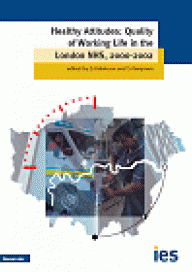Publications
 We author and publish a range of resources to keep you up to date with the latest developments in employment, labour market and human resource policy and practice.
We author and publish a range of resources to keep you up to date with the latest developments in employment, labour market and human resource policy and practice.
All our pdf publications are free to access.
Search results
-

Monitoring the Disability Discrimination Act (DDA) 1995: Phase 3
Hurstfield J, Meager N, Aston J, Davies J, Mann K, Mitchell H, O'Regan S, Sinclair A | Jan 2004 | Department for Work and Pensions, and Disability Rights CommissionThis report presents the findings of research by the Institute for Employment Studies on behalf of the Disability Rights Commission in partnership with the Department for Work and Pensions and the Equality Commission, Northern Ireland. The research, conducted during the period October 2002 to May 2003, is the third phase of a series of studies monitoring the implementation of the DDA.
-
📄
Understanding Employee Opinions
Robinson D | Jan 2004 | Institute for Employment StudiesThis briefing aims to help you think about employee opinions, specifically: Why collect employee opinions in the first place. Is there are business benefit? What different methods are available for gathering employee opinions, and which is best for your organisation? How can your employee opinion survey really help you in understanding and managing your workforce?
-
📄
Survivor Syndrome
Key Considerations and Practical Steps
Wolfe H | Jan 2004 | Institute for Employment StudiesDespite the relative lack of empirical work about survivor syndrome, there seems little doubt of its existence, and the challenges it poses not only to the HR function, but also the organisation as a whole. Strategies for tackling such an issue are highly organisation-specific, but there are several overriding themes and considerations that may help inform approaches to current, and future, organisational change.
-

Healthy Attitudes
Quality of Working Life in the London NHS, 2000-2002
Robinson D, Perryman S (eds) | Dec 2003 | Institute for Employment StudiesThe first Human Resource Strategy for the NHS ('Working Together') was published in September 1998. This required all NHS employers to carry out annual surveys of the attitudes of their staff. Since then, IES conducted three annual London-wide surveys, on behalf of a total of 99 London employers. A total of 97,000 employees at all levels completed questionnaires. This report encapsulates their views.
-
📄
Evaluation of the Disabled Person's Tax Credit (DPTC): A Survey of Recipients
Atkinson J, Meager N, Dewson S | Dec 2003 | Inland RevenueThis report sets out the results from a representative survey of 1,315 recipients of the Disabled Person's Tax Credit (DPTC) conducted during the summer and autumn of 2001. It forms part of a comprehensive programme launched by the Revenue to monitor and evaluate Working Families Tax Credit (WFTC) and DPTC. This report considers the socio-demographic characteristics of DPTC recipients. It then looks in turn at recipients' initial engagement with DPTC, at DPTC provisions and childcare, and at the re-application process.
-

Evaluation of Employer Training Pilots
Hillage J, Mitchell H | Dec 2003 | Department for Education and SkillsThe Employer Training Pilots (ETP) were established in six Learning and Skills Council areas in September 2002, aiming to provide training to a first level 2 qualification, or in basic skills for employees. They were successful in getting a substantial numbers of employers involved in training their low-skilled employees to achieve qualifications. Employers and learners expressed high levels of satisfaction with their experience of the pilots.
-
📄
Labour Market Involvement in Quality Assurance in Vocationally/Professionally Oriented Higher Education in Europe
Final Report, England
Lain D, Maginn A | Nov 2003 | Institute for Employment StudiesThis report examines how (if at all) vocational higher education is responsive to the needs of the labour market, and how this is related to quality assurance policies, procedures and structures. The research was conducted in five countries with a diversity of experiences in this area: Holland, Germany, Spain, France and England.
-
📄
A Review of Community Race Relations (CRR) Training in the Metropolitan Police Service
Tamkin P, Pollard E, Tackey N D, Strebler M, Hooker H | Nov 2003 | Metropolitan Police AuthorityThis report detailed the findings of an extensive review of Community and Race Relations training in the Metropolitan Police Service. Commissioned by the Metropolitan Police Authority (MPA), the research was designed to provide an independent evaluation of the training. This publication is no longer available.
-

e-Recruitment: Is it Delivering?
Kerrin M, Kettley P | Oct 2003 | Institute for Employment StudiesThis report provides survey and detailed case study evidence of the experiences of organisations in implementing e-recruitment. It also illustrates perceived benefits, and evidence of barriers to implementation. A key message for recruiters is to acknowledge that the adoption of e-recruitment is about more than technology. Most significantly, e-recruitment is to do with cultural and behavioural change, both within HR and amongst line managers. For e-recruitment to deliver, it is about developing the capability of HR to facilitate the system, and to view the staffing process as an end-to-end process, similar to that of a supply chain.
-

New Reward I
Team, Skill and Competency Based Pay
Reilly P (ed.) | Oct 2003 | Institute for Employment StudiesThe report critically examines why organisations choose to introduce team, skill or competency based pay. It looks at the evidence of whether many organisations are operating these practices. It considers what benefits they have found, but equally what difficulties they have faced. This involves reviewing the mechanics of how organisations operate such devices and the sort of design decisions they have to make.
